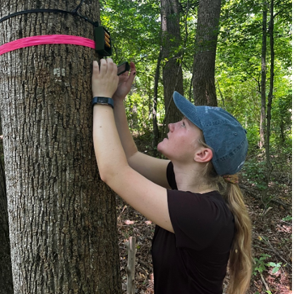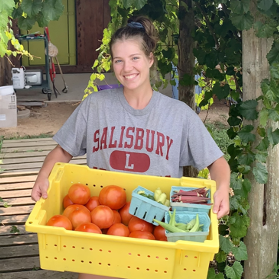Meet the 2023 Molchanov Scholars
October 24, 2023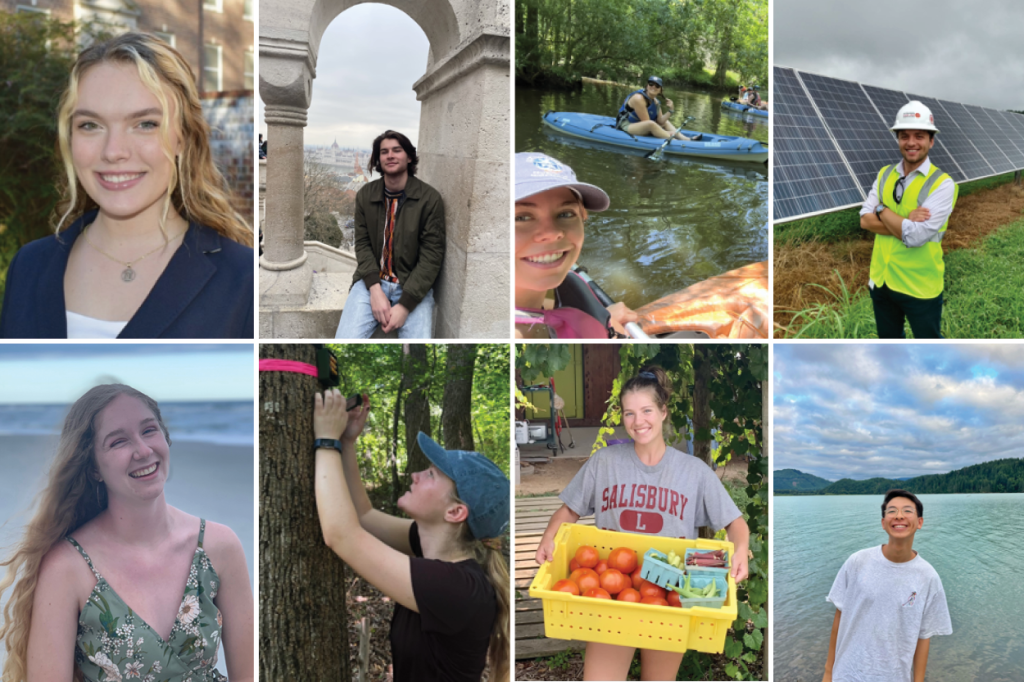
Over the summer, eight UNC students were paired with environmental organizations across the state to build their skills for a future in an environmental field through internships. These experiences were made possible by the Pavel Molchanov Scholars Program, an endowed internship program that provides students with a $5,000 stipend to support their summer employment. Since its inception in 2019, 26 UNC students have experienced an internship through the Pavel Molchanov Scholars program.
Funded by a $1 million gift from Pavel Molchanov, the program matches undergraduate students with environmental internships where students can supplement their academic work with experiential, professional training.
The Pavel Molchanov Scholars program is a partnership between the UNC Institute for the Environment and environmentally-focused small businesses, non-profit organizations and government institutions in North Carolina, South Carolina and Virginia.
The UNC Institute for the Environment addresses environmental challenges by developing collaborations among diverse academic fields, public and private partners, and an informed and committed community. Undergraduate students in any environmentally-themed degree program who are interested in tackling complex environmental issues can apply for the Molchanov Scholarship.
Molchanov is a director and equity research analyst at Raymond James & Associates. He joined the firm in 2003 and has since been working as part of the Energy Group, researching oil and gas, renewables, and clean technology. He joined the UNC Institute for the Environment Board of Visitors as a member in 2019, and he also serves as a member of the advisory board at Cool Effect, an environmental project-funding charity.
Meet the 2023 Molchanov Scholars.
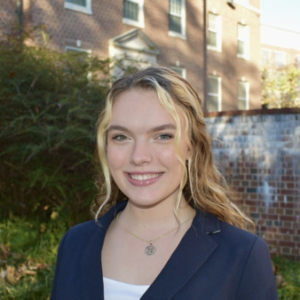 Anna Coley
Anna Coley
Internship: North Carolina Sustainable Energy Association
Hometown: Concord, N.C.
What type of career do you want to pursue and why?
I am interested in pursuing a career in the clean energy or energy policy sector. Specifically, I would love to work for a government agency or nonprofit focused on clean energy implementation or clean energy policy. In high school, I learned about the impacts of human behavior on the Earth from anthropogenic climate change to water and air pollution. Since then, I have learned more about environmental issues, especially from an environmental justice angle, which has inspired me to pursue a career that utilizes policy to reduce the human impact on the Earth’s land and climate .
What was your internship and what was your role?
I interned with the North Carolina Sustainable Energy Association (NCSEA), specifically as a Marketing Intern with their Marketing and Communications Team. I created content for direct member communications, social media, and the NCSEA website. I also worked with other teammates to develop a planning strategy for NCSEA’s annual conference, as well as helping to edit and revise various projects from blogs to infographics for research summaries.
What has been the most rewarding experience you have had at your internship?
The most rewarding experience I had was working on a project with the other summer interns at NCSEA. Throughout the summer, we read and discussed Dr. Shalanda Baker’s Revolutionary Power: An Activist’s Guide to the Energy Transition, as part of an intern book club. At the end of the summer, we gave a presentation to the entire staff on our work, the book we had read, and all of the connections we found between the two. This was such a fun experience, and I was able to learn so much from my fellow interns as well as from the lessons in the book.
What do you think you have gained from your internship?
On the practical side, I was able to gain skills in website maintenance, business strategy development, CRM use, graphic design, and professional social media use. But more memorably, I gained so much knowledge from interacting with and learning from the NCSEA staff. There was such a variety of information flowing at NCSEA, from energy efficiency policy updates to residential solar energy data mapping. Being exposed to this kind of knowledge was amazing and eye-opening to the realities of working in the clean energy field.
What advice do you have for others pursuing your field of study?
I would advise those interested in Environmental Science or clean energy to find opportunities to get involved on campus. I would definitely recommend applying for the Pavel Molchanov Scholar Program to gain real-world experience and get a better sense of where your interests in the field lie. Additionally, there are so many options to explore during the school year, from Ecostudio internships, the Institute for the Environment, the Environmental Finance Center, the North Carolina Collaboratory, and so many more. Finally, don’t be afraid to reach out to professors, students, or alums who are studying or practicing what you’re passionate about!
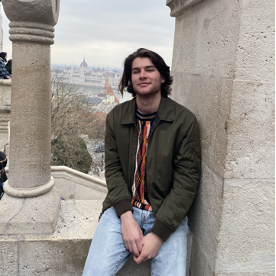 John M. D’Ambrosio
John M. D’Ambrosio
Internship: Heelstone Renewable Energy
Hometown: Cary, NC
What type of career do you want to pursue and why?
My goal is to pursue a career in environmental law. A clean and healthy environment is important for all people, and I believe the law is an important tool for promoting environmental justice. As a native North Carolinian, I have been inspired by the people of Warren County for their creation of the environmental justice movement. I want to continue the fight they started utilizing the legal system.
What was your internship and what was your role?
For my internship, I was the financial intern for Heelstone Renewable Energy in Chapel Hill. Heelstone Renewable Energy is an independent power producer and solar developer. During my time working with Heelstone, I worked with the finance team to analyze the costs and benefits of potential large-scale solar operations. I received Excel training at Heelstone which allowed me to utilize and make financial models for the company. After learning how to use Heelstone’s financial model, I analyzed potential solar sites and got to see how Heelstone made its solar investment decisions. I also performed a large amount of research for Heelstone on solar panel supply chains, lithium batteries, government policies, AI technologies, and much more. For my final project, I was tasked with creating an attractive financial model that Heelstone will use to entice large energy producers to utilize solar.
What has been the most rewarding experience you have had at your internship?
While I want my future to be in environmental law, working as the financial intern for Heelstone I got to see the true costs and benefits of one aspect of the sustainability movement. This is a vital experience because having a financially achievable sustainable future is crucial and working with a company like Heelstone showed me that is very possible. Additionally, all the projects that Heelstone invested in created thousands of jobs and energy for areas all over the United States, which was very rewarding to see.
What do you think you have gained from your internship?
From my work at Heelstone, I have gained first-hand experience of how the partnership between the public and private sectors is driving the sustainable future. This opportunity greatly developed my perspective on how there are many avenues and efforts promoting a green future. I also gained enriching workspace experience that improved my teamwork and time management skills in performing high-quality work within important deadlines. Heelstone also showed me the importance of strong leadership and active teamwork in achieving sustainability goals. It is going to take all of us!
What advice do you have for others pursuing your field of study?
The advice I have for others pursuing my field of study is to not get discouraged. There are so many people who want to support you in your future endeavors because they know you want to make the world a better place for everyone. There may be times when you feel you do not have the appropriate skills to achieve your goals but do not be afraid to ask questions and for help. Finally, do not forget to thank and stay in touch with the people who help you along the way. You are where you are because of a community that cares for you!
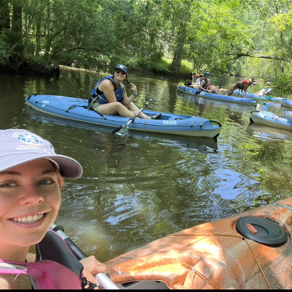 Rachel Geyer
Rachel Geyer
Internship: Sound Rivers
Hometown: Waxhaw, N.C.
What type of career do you want to pursue and why?
I want to pursue a career in coastal/marine ecology and conservation. I’ve always known that I wanted to work in ecology and better the world around me while being fully immersed in nature through fieldwork, but for a while, I wasn’t sure exactly what area I wanted to focus on. My time at UNC has allowed me to discover a greater appreciation for coastal ecosystems — beyond loving the beach. I want to research how we can protect these ecosystems as a whole, particularly reef ecosystems. In addition, I want to use what I’ve learned from my journalism minor to communicate what’s going on with these environments to the public as best I can.
What was your internship and what was your role?
This summer, I was a Water Quality Intern with Sound Rivers, a non-profit organization protecting the Neuse and Tar-Pamlico rivers. My main role was to run the Swim Guide program for the Upper Neuse. This involved working with volunteers who collected water samples for us, taking water samples myself, processing these samples to test them for E. coli and communicating the results to the rest of Sound Rivers and anyone who wants to check their local water quality on the Swim Guide website. In addition, I got to conduct my own point-source pollution testing, help clear out trash traps and investigate local pollution sources.
What has been the most rewarding experience you have had at your internship?
The most rewarding — and unexpected — experiences I had were all of the random interactions I had with everyday people while on the job. Curious passersby would ask what I was up to, and I got to explain what Sound Rivers was and spread the word about local river conservation to people who would otherwise be uninvolved.
What do you think you have gained from your internship?
Firstly, I gained a lot of experience from my internship this summer. I got a taste of doing fieldwork and “roughing it” in nature, I learned how to process samples and use lab equipment outside of a classroom, I got to be a leader for the Upper Neuse volunteers and I got to be an integral part of a professional environment. However, the most valuable thing I gained from this internship was a sense of belonging. Dreaming of working in conservation was one thing, but it wasn’t until after this summer that I could say, without a doubt, that this is where I want to be. Along with the joy of the outdoors being part of my office, a huge part of this was realizing that in a job like this, all of my coworkers are as equally passionate about the environment as I am; the staff at Sound Rivers truly made me feel at home.
What advice do you have for others pursuing your field of study?
The best advice I could give to others pursuing ecology and conservation is the same I’ve been hearing from my advisors: get experience. I’d like to add that in addition to this being the best way to get the positions you want in the future, getting experience made me fall even more in love with the natural world around me. I think in a field like this, it’s important to be passionate about the cause you’re working towards, and you can’t do that without allowing yourself to experience what it is you’re working towards.
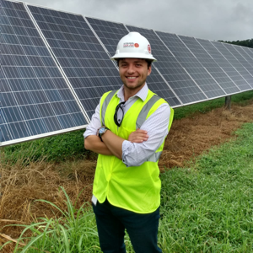 Gianluca Giuffreda
Gianluca Giuffreda
Internship: Strata Clean Energy
Hometown: Huntersville, N.C.
What type of career do you want to pursue and why?
I want to pursue a career in clean energy because I am passionate about finding solutions at the intersection of clean energy, the environment, and data.
What was your internship and what was your role?
My internship was with Strata Clean Energy, a verticallyintegrated, utility-scale solar company based in Durham, NC. I took on three projects during my time at Strata.
My principal role was to assist with module and inverter repowering efforts at Strata-owned solar sites. I participated in weekly, problem-solving meetings with the repowering team, coordinated with various business groups, and maintained a detailed project timeline. I also worked with the software development team to create a database on SQL server for market research.
Separate from my repowering project, I researchedAgrivoltaics (the co-location of solar and agricultural practices)and compiled my findings into a written report. At the conclusion of my research, I presented an integrated row-cropping solution to key stakeholders internally.
Lastly, I worked with the engineering and front-end teams tomap out a solar design and cost optimization tool in python. I outlined the structure of the program and demonstrated its benefits to company workflow and bottom line in a written report.
What has been the most rewarding experience you have had at your internship?
If I had to choose one part of my internship that was the most rewarding, it would have to be my visit to an active solar site in NC which was the subject of the repowering project we had worked hard on all summer. Together with my two colleagues, I identified equipment, walked through the system, and took photos of the string inverters and AC combiners that were to be retrofitted. It was a great way to apply what I had learned and get some hands-on experience with our project.
What do you think you have gained from your internship?
I came out of my internship experience at Strata with stronger technical skills, newfound interests in the industry, and an elevated passion for clean energy. I was fortunate to get familiar with the solar industry from development all the way to end-of-life. Repowering is a pressing subject for the future of the solar industry and I feel confident in applying what I learned to craft solutions. Throughout all of this, I met so many talented people and made a lot of friends. My experience would not have been the same if it was not for the friendly faces and positive interactions I had with the team every day.
What advice do you have for others pursuing your field of study?
If you are someone pursuing a career in energy, I would encourage you to always be curious and have an open mind. I was fortunate to work with a company like Strata because I was rewarded for pursuing my interests and asking questions. One of my favorite things about clean energy is that it very interdisciplinary, so there are plenty of opportunities for synergy across subjects you may not have encountered in the classroom. Ultimately, be open, passionate, and apply yourself.
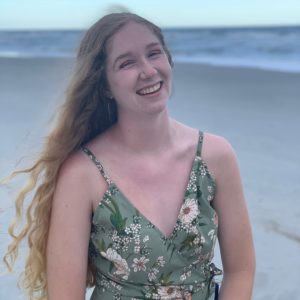 Annabel Margaret Grocott
Annabel Margaret Grocott
Internship: Sea-Ahead
Hometown: Waxhaw, N.C.
What type of career do you want to pursue and why?
I want to pursue a career in cleantech innovation either by working at a startup or doing research to advance climate technology. I feel a responsibility to contribute to the work being done to mitigate the climate crisis and this is the best way for me to do so.
What was your internship and what was your role?
I served as a Marketing and Business Development Intern for SeaAhead, a Boston-based company focused on supporting emerging bluetech startups through their accelerator and incubator programs and their angel investor network. My key responsibilities were creating and scheduling social media content, designing presentations, doing research on prospective business leads, and curating the biweekly newsletter.
What has been the most rewarding experience you have had at your internship?
I had the opportunity to interview a couple of startup founders who participated in a previous cohort of SeaAhead’s accelerator program. Hearing about their backgrounds and their journeys to create their respective startups was fascinating and reassured me that no one takes a linear path to where they are today.
What do you think you have gained from your internship?
I have gained exposure to the world of climate innovation through our oceans and how we can use them in the fight against climate change. I was able to delve into the world of social media marketing, communications, and grant writing all of which I had never done previously.
What advice do you have for others pursuing your field of study?
Try everything. The only way you will be able to find out what does and doesn’t interest you is by dipping your toe into all the different areas that sustainability and environmental science play into.
Kristina Hefferle
Internship: Greensboro Science Center
Hometown: Denville, NJ
What type of career do you want to pursue and why?
After I finish my undergraduate studies in Biology and Anthropology, I hope to find a position that will combine my passions for wildlife and environmental biology with local community engagement. I am interested in continuing to do research, specifically within the realm of wildlife biology, but also focus on communicating that science to the public and allowing people to engage in research through citizen science projects in ways that are meaningful to them.
What was your internship and what was your role?
This summer I was an intern at Greensboro Science Center in their research and conservation department on a multi-year, multi-site wetland mitigation project. I led data analysis on their bat project and studied activity patterns to understand the importance of habitat type and land use on bat activity. I also assisted other researchers in the field with small mammal trapping, coverboards, water quality assessment, and checking trail cameras and bat monitors.
What has been the most rewarding experience you have had at your internship?
Field work, whether it be small mammal trapping or coverboards, was the most rewarding experience I had at my internship. It gives a tangible aspect to the science you learn in the classroom, and it’s really meaningful to actually hold the animals in your hands and be able to identify what they are, their life history information, and whether they are native or not. It really gives meaning to the larger project at hand when you know exactly what wildlife you are affecting, and it’s impossible not to be passionate about your work when you get to handle all of the creatures that live beyond the scope of what you would typically see.
What do you think you have gained from your internship?
Throughout this internship, I have become far more comfortable working with large data sets and working with R for data analysis. I have always loved field work and wildlife, but the skills I learned in data analysis this summer have really solidified my interests in not only working within the field of wildlife biology, but specifically with research. Gaining confidence in R, as well as the other programs necessary to process bat data like Kaleidoscope Pro, made finding the answers to research questions, and what story you can tell with them, interesting and satisfying.
What advice do you have for others pursuing your field of study?
I would remind others in my field that it is never too late to change directions. I made an abrupt shift towards wildlife and environmental biology and added my second major halfway through my undergraduate career. You never know what lies around the corner, so it is always worthwhile to make the leap and try new things, even if its outside of your comfort zone. You never know if you’re about to find the topic you are truly passionate about and meet amazing people along the way.
Karen Jordan
Internship: Center for Environmental Farming Systems
Hometown: Ocracoke Island, N.C.
What type of career do you want to pursue and why?
I want to pursue a career in sustainability management within the food industry. I want to make a significant and positive difference in improving our food system, especially regarding climate change and environmental issues. Sustainability management is a growing field, and I’m very interested in using business to create solutions and support for farms and other food producers.
What was your internship and what was your role?
I had two internships with the Center for Environmental Farming Systems (CEFS). The first was at their primary research and demonstration farm at the CEFS Small Farm Unit in Goldsboro, While there, I assisted in delivering research and demonstration of sustainable food production and marketing practices, and, more specifically, collected data on experiments that tested ethnic vegetables’ organic production capability. I also gained hands-on experience in harvesting and daily farming activities and was involved with NCA&T extension. The second internship was at NC State’s Agroecology Education Farm, Raleigh. I learned that agroecology is the study of agriculture as an ecological system, and its core principles correlate strongly with environmental sustainability principles. While there, I was also given the opportunity to perform soil testing and analyses of soil health indicators on the farm and assist with agroecology education and volunteer events.
What has been the most rewarding experience you have had at your internship?
The most rewarding experiences I’ve had at my internships were the connections I created with my mentor and co-workers, especially at NC State. I feel welcome to continue my involvement with NC State through their Agroecology Club events and reach out to professionals and educators I met through NC State and CEFS at large. By creating diverse connections, I have learned a lot through conversations about sustainable agriculture practices in the food industry.
What have you gained from your internship?
I am confident in beginning a career within the food system that can make positive changes for a healthy food system and environment. This confidence stems from the skills and education I gained, such as insight into environmental/agricultural research, marketing techniques within the sustainable food industry, hands-on training in farming, and the ability to teach others about agricultural research and agroecology.
What advice do you have for others pursuing your field of study?
I advise those pursuing sustainable food studies to constantly seek and advocate for opportunities within and outside their internships/courses. The field is much larger and more complex than I initially thought, and there is so much to explore. I’ve discovered that being proactive is the best way to do this. I’ve grown my skills and knowledge quite a bit outside of what is offered at UNC and even what was in the original descriptions of my internships.
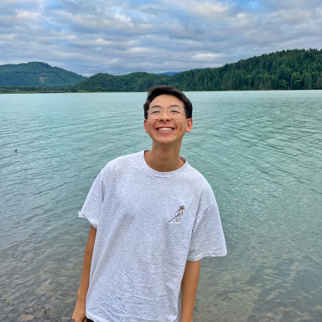 Jason Yan
Jason Yan
Internship: Cypress Creek Renewables
Hometown: Charlotte, N.C.
What type of career do you want to pursue and why?
As of now, I’m still trying to figure out what exact career path I want to pursue but I’m interested in potentially getting into environmental consulting, impact investing, or just anything generally related to environmental health equity. I really just want to do something that has to do with sustainability and is enjoyable yet fulfilling and stimulating.
What was your internship and what was your role?
I was a project development intern on the Southeast Transmission team at Cypress Creek Renewables. Through this, I helped with various day to day tasks such as land acquisitions and originations, sitting in on stakeholder calls, and culminating with leading my own project investigating the public health benefits of utilizing solar energy.
What has been the most rewarding experience you have had at your internship?
The most rewarding experience was probably the final presentation day that officially concluded my internship. Cypress Creek organized an intern cohort final presentation in their Santa Monica office and it was just so cool to see the interns face to face since we were all based in different offices and finally be able to hang out and just learn about the projects that they undertook throughout their summers. Being able to share my project as well was a super cool and enriching experience and it felt great to finally share my research.
What do you think you have gained from your internship?
Going into this internship, I knew remotely nothing about the solar industry as a whole and after going through this internship, I have seen so many new aspects of solar development that I didn’t even think of before. From the detailed protocols throughout the land acquisition process to the various grassroots community-based events, and just overall being able to see the steps that bring a solar project to fruition from nothing to utility-scale has been amazing. In addition, the corporate experience of an internship was eye opening and navigating the workforce was new for me as well! Overall, it was a super constructive experience and I learned various skills that I will be able to apply in the future.
What advice do you have for others pursuing your field of study?
I would advise anyone interested in the field of sustainability or renewables to explore their options within that specific field. There are limitless possibilities and if there’s one position you don’t necessarily enjoy, that doesn’t mean that overall field isn’t for you. Working on the project development team was one mere facet of the entire company. There are so many other teams within each industry and there is definitely something that will cater to your interests.

